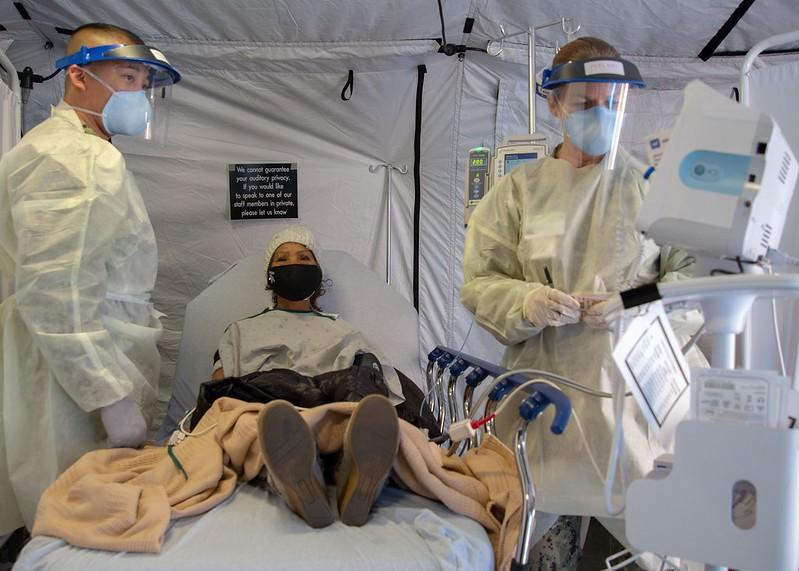Critically ill COVID-19 patients who received interleukin-6 (IL-6) receptor agonists and antiplatelet drugs had a higher than 99.9% and 95.0% probability of improved 6-month survival, respectively, according to the latest data from the REMAP-CAP randomized clinical trial.
REMAP-CAP (Randomized Embedded Multifactorial Adaptive Platform for Community Acquired Pneumonia) is an ongoing international platform trial assessing treatments for patients with severe pneumonia due to COVID-19 or other respiratory pathogens.
The most recent results, from a secondary analysis of longer-term outcomes, were published late last week in JAMA. The investigators randomly assigned 4,869 adult COVID-19 patients admitted to an intensive care unit to receive one or combinations of six therapies from Mar 9, 2020, to Jun 22, 2021, at 197 sites in 14 countries.
Hydroxychloroquine likely to harm
Of the 4,869 patients, 2,274 received the IL-6 receptor agonists (anti-inflammatory monoclonal antibodies) tocilizumab and sarilumab, 2,011 were given convalescent plasma from COVID-19 survivors, 1,557 received antiplatelet drugs such as aspirin or clopidogrel, 1,033 were given the anticoagulant heparin, 726 received antivirals, and 401 were given corticosteroids. Antiplatelet and anticoagulant drugs are used to prevent blood clots.
Six-month survival status was available for 4,107 (95.1%) of 4,318 patients at sites conducting 6-month follow-up. Average patient age was 59.3 years, and 32.1% were women. Of the 4,107 patients with known 6-month status, 36.9% died. Ninety-one of 1,516 deaths (6.0%) by 6 months occurred after hospital release.
IL-6 receptor agonists showed a 99.9% probability of boosting 6-month survival (adjusted hazard ratio [aHR], 0.74) compared with controls, and antiplatelet drugs had a 95.0% likelihood of doing so (aHR, 0.85). The probability of failure to improve survival, however, was high for anticoagulants (99.9%; HR, 1.13), convalescent plasma (99.2%; HR, 0.99), and the antiviral combination lopinavir-ritonavir (96.6%; HR, 1.06).
The likelihood of harm was high for the antimalarial drug hydroxychloroquine (96.9%; HR, 1.51) and for the combination of lopinavir-ritonavir and hydroxychloroquine (96.8%; HR, 1.61). The corticosteroid arm was stopped early when it was found to have only a 57.1% to 61.6% probability of improving 6-month survival.
Lower disability, higher quality of life
Disability and quality-of-life data were available from less than 40% of participants. A total of 273 of 720 survivors (37.9%) had moderate, severe, or complete disability at 6 months. IL-6 receptor antagonists had a 92.6% probability of reducing disability, and lopinavir-ritonavir had a 91.7% likelihood of worsening disability.
Most patients who survived to 6 months said they had good health-related quality of life (HRQoL) and functional status, although about 1 in 3 still had at least moderate disability. IL-6 receptor agonist recipients had an 87.0% chance of improved HRQoL and a 92.6% probability of reduced disability, which the authors said suggests that longer survival did not come at the expense of reduced HRQoL.
Likewise, antiplatelet medications were tied to a 97.4% chance of improved HRQoL at 6 months. "Given the global effect of COVID-19, small differences in mortality or other patient-centered outcomes, such as HRQoL and disability, can result in important clinical and health economic benefits at the population level, particularly in a global pandemic," the researchers wrote.
IL-6 receptor agonist recipients had an 87.0% chance of improved health-related quality of life and a 92.6% probability of reduced disability.
In a related commentary, Michael Barnett, MD, of the Harvard T.H. Chan School of Public Health, and Paul Sax, MD, of Brigham and Women's Hospital, note that COVID-19's disease manifestations have changed since the study period, with higher population-level rates of previous infections and vaccination and continued viral mutations.
"The evidence in this study remains valuable given that COVID-19 will continue to be a common cause of critical illness globally," they wrote. "However, the most effective strategy to reduce mortality and critical illness will be prevention through a global effort to expand COVID-19 vaccination."






















